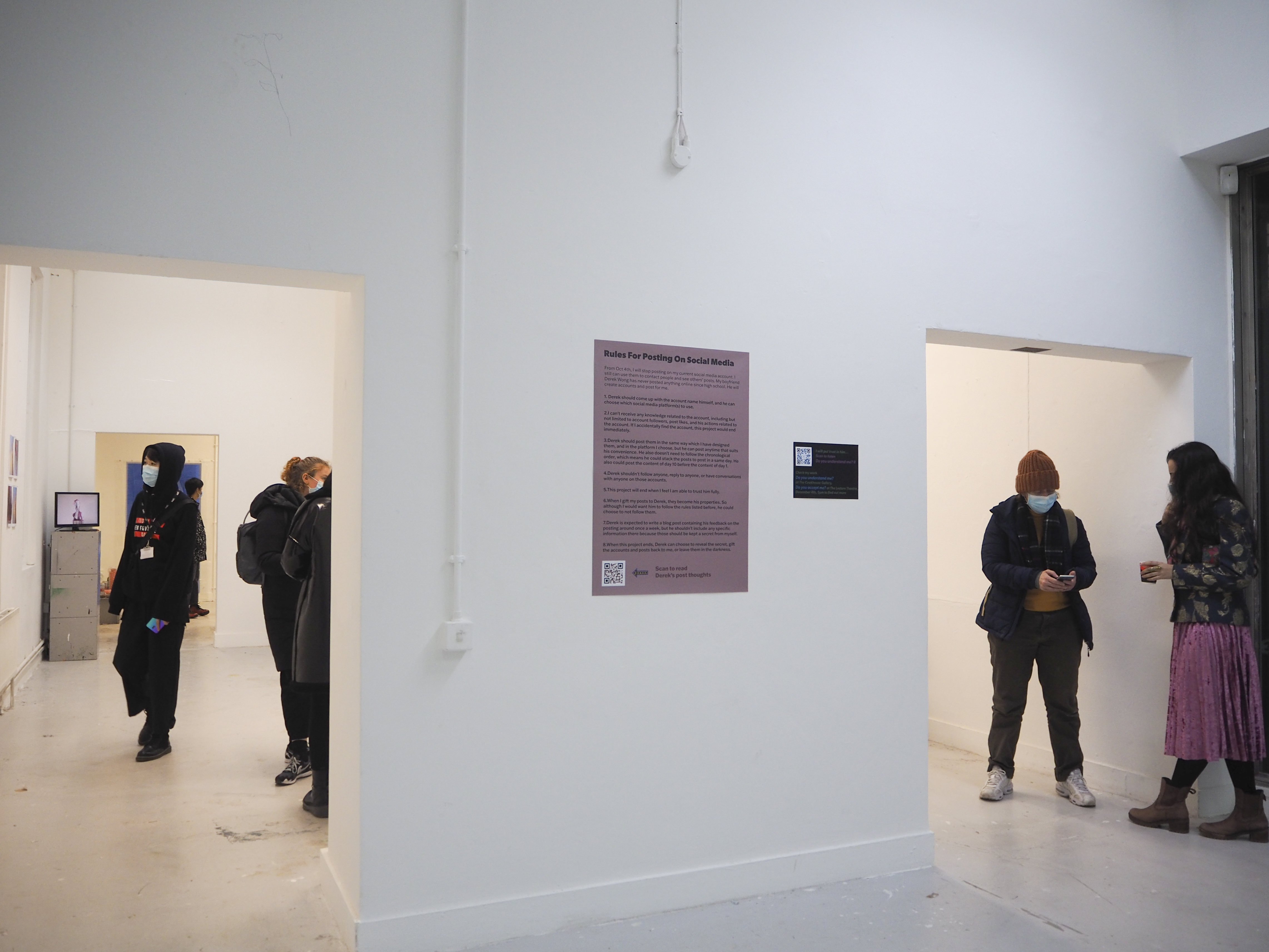
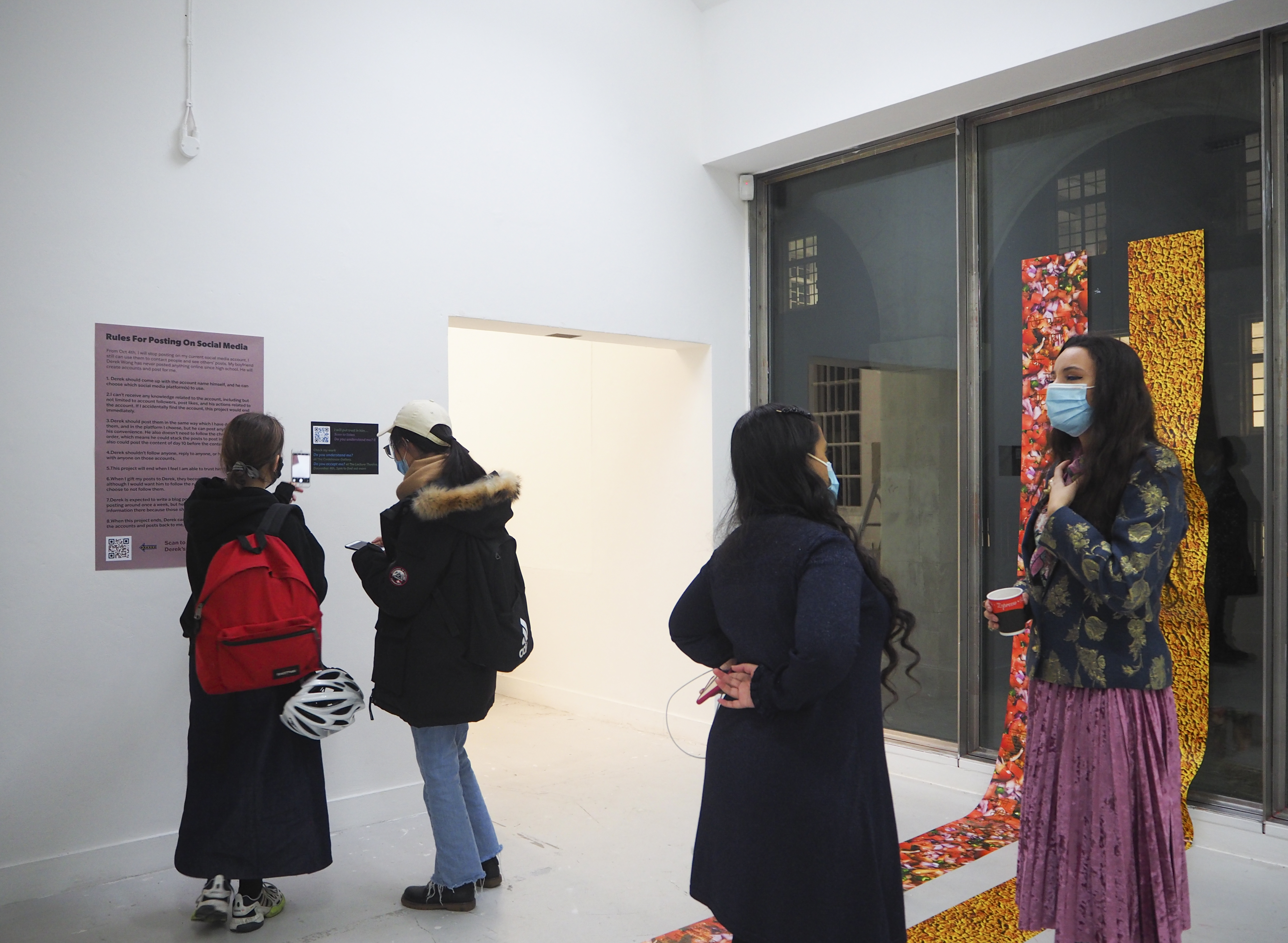
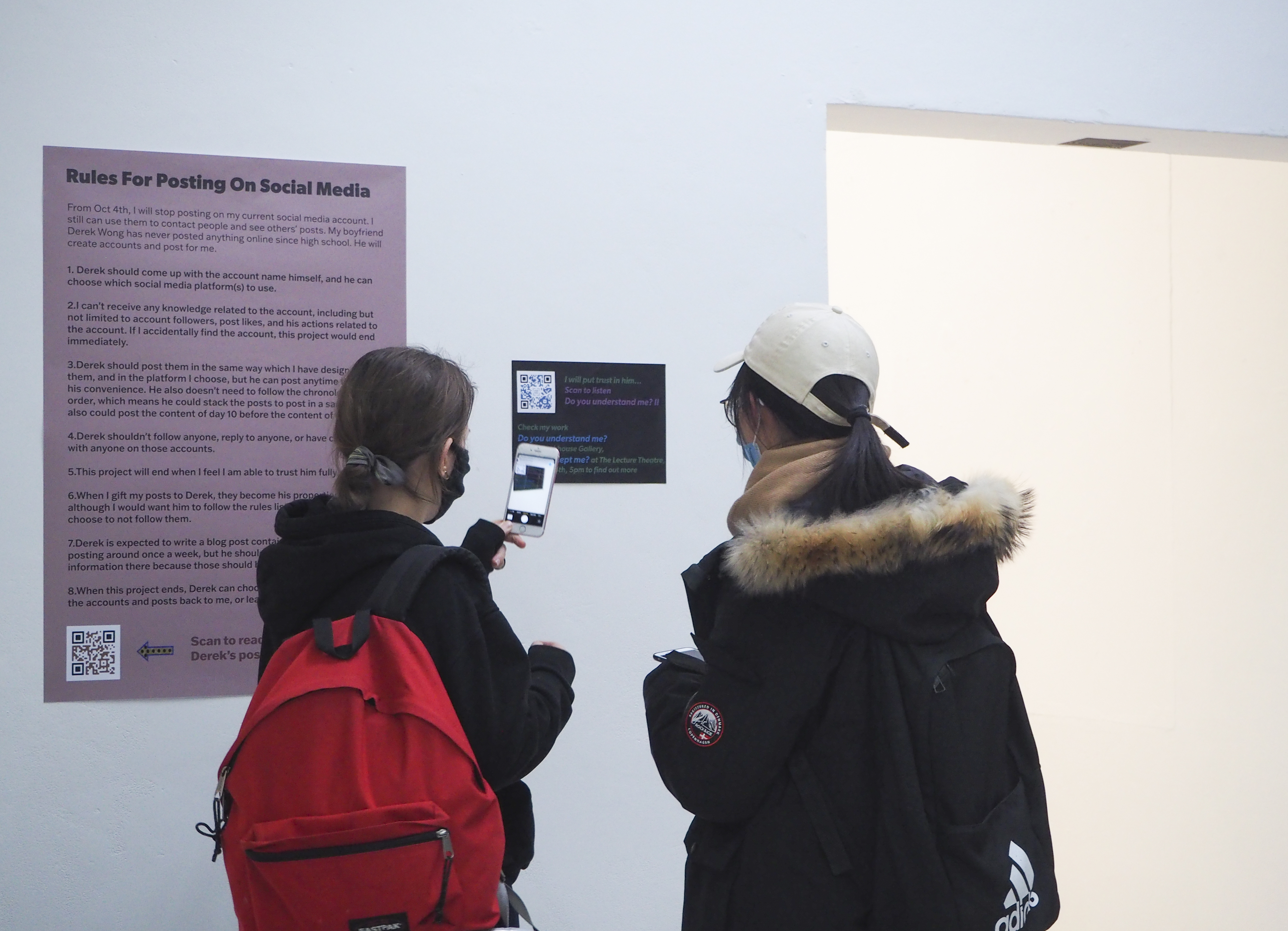
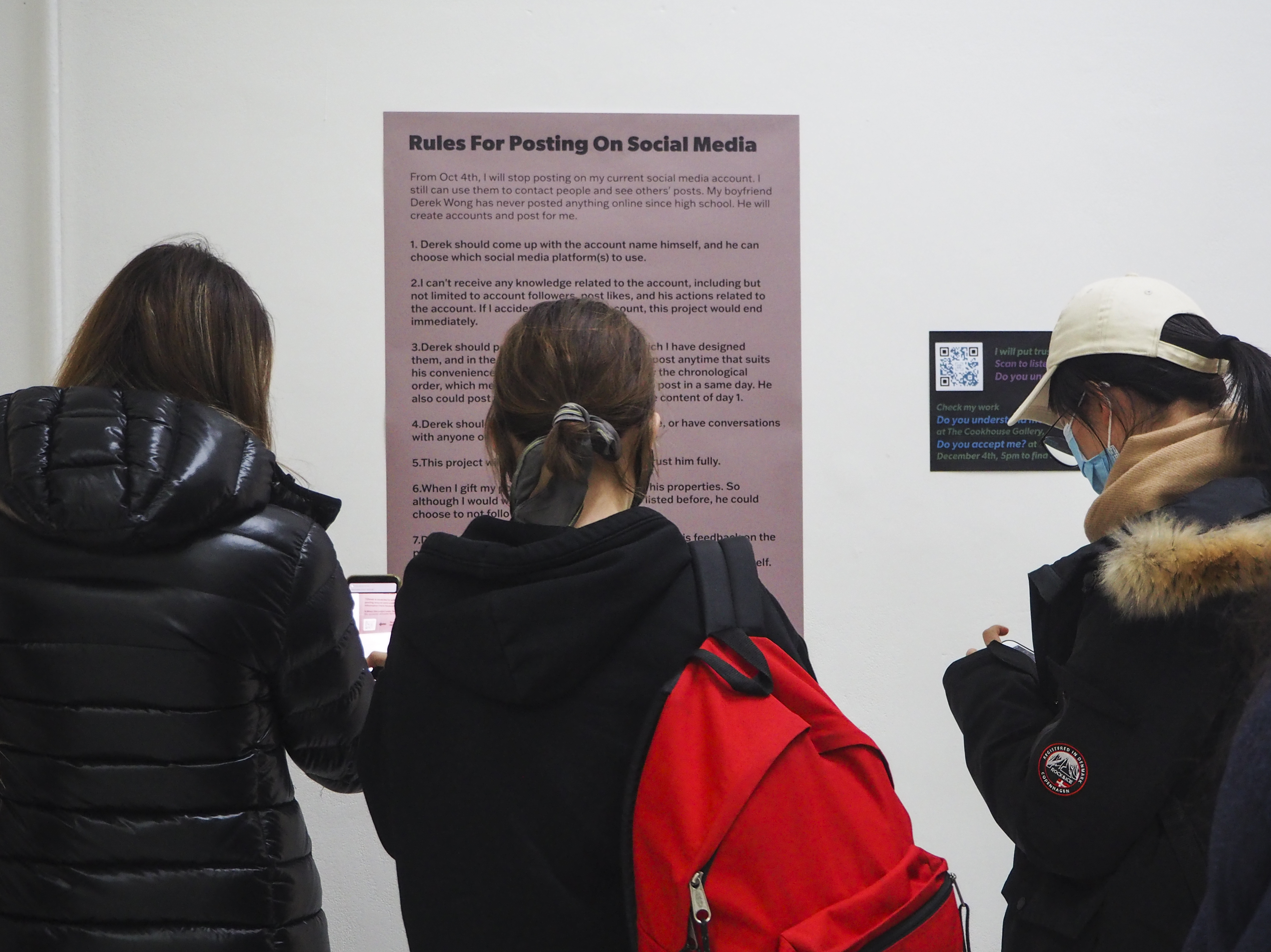
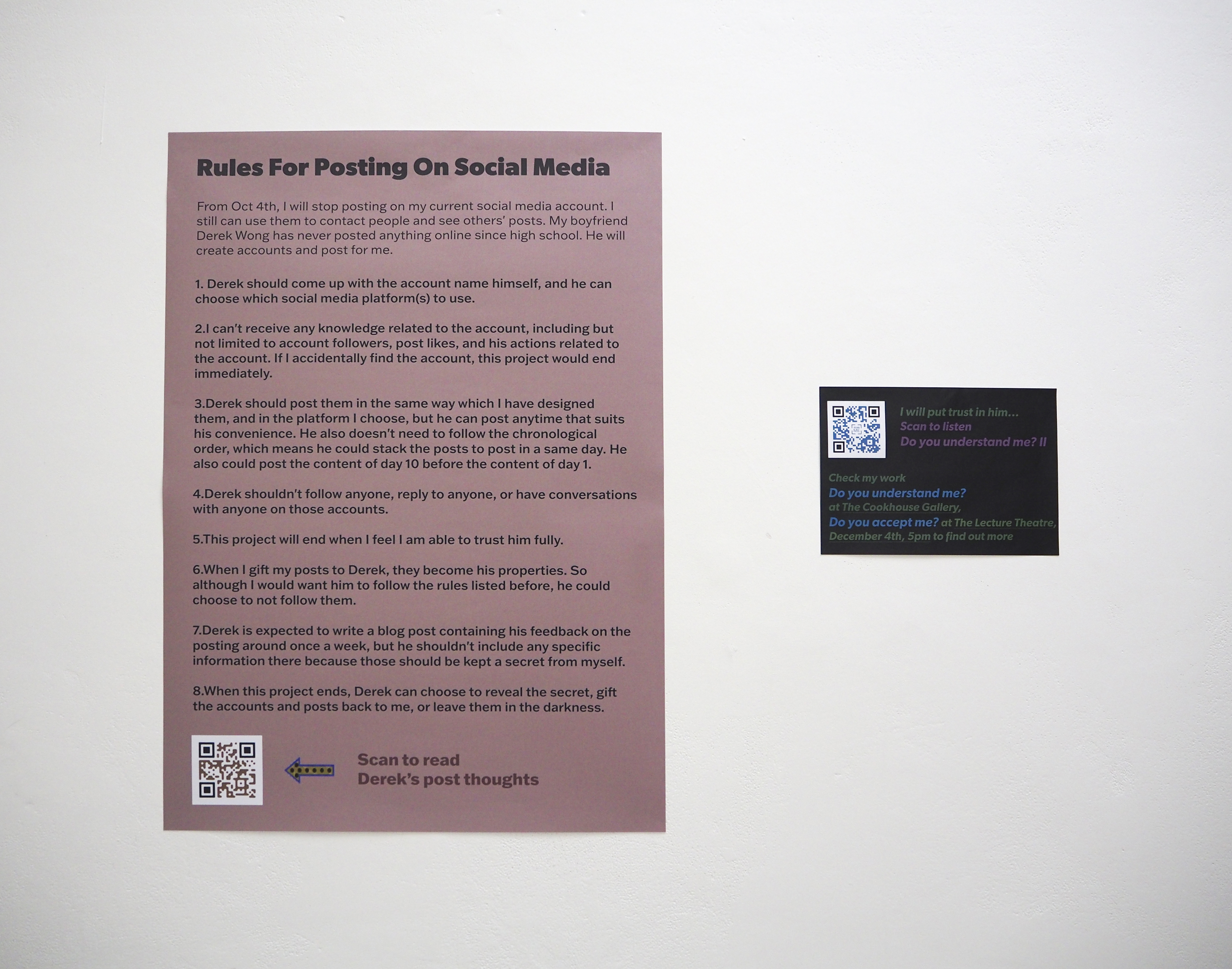
Exhibition at the Cookhouse Gallery, Chelsea College of Arts
Orginal blog posts:
Orginal blog posts:
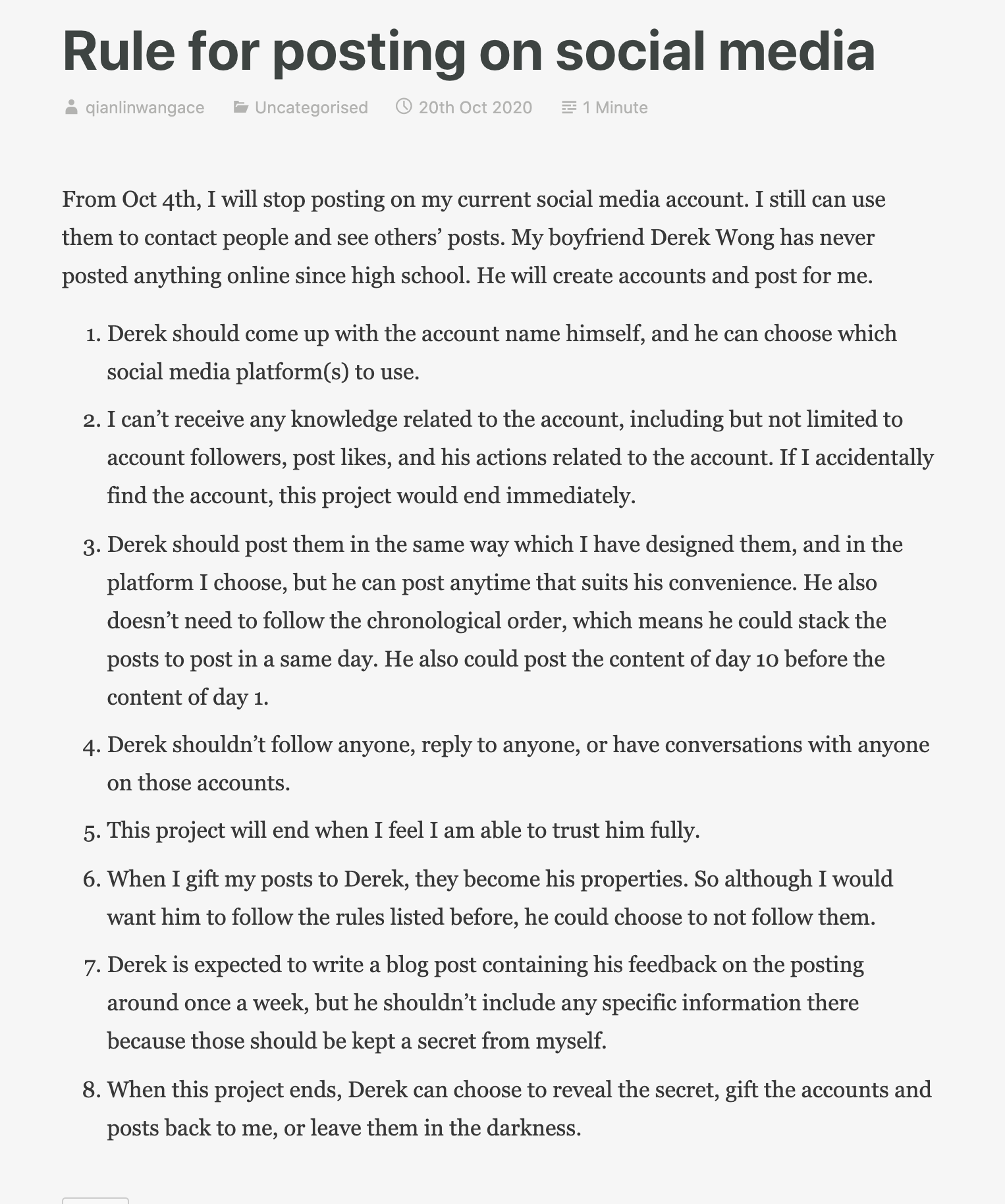
Feedbacks written by Derek about posting:
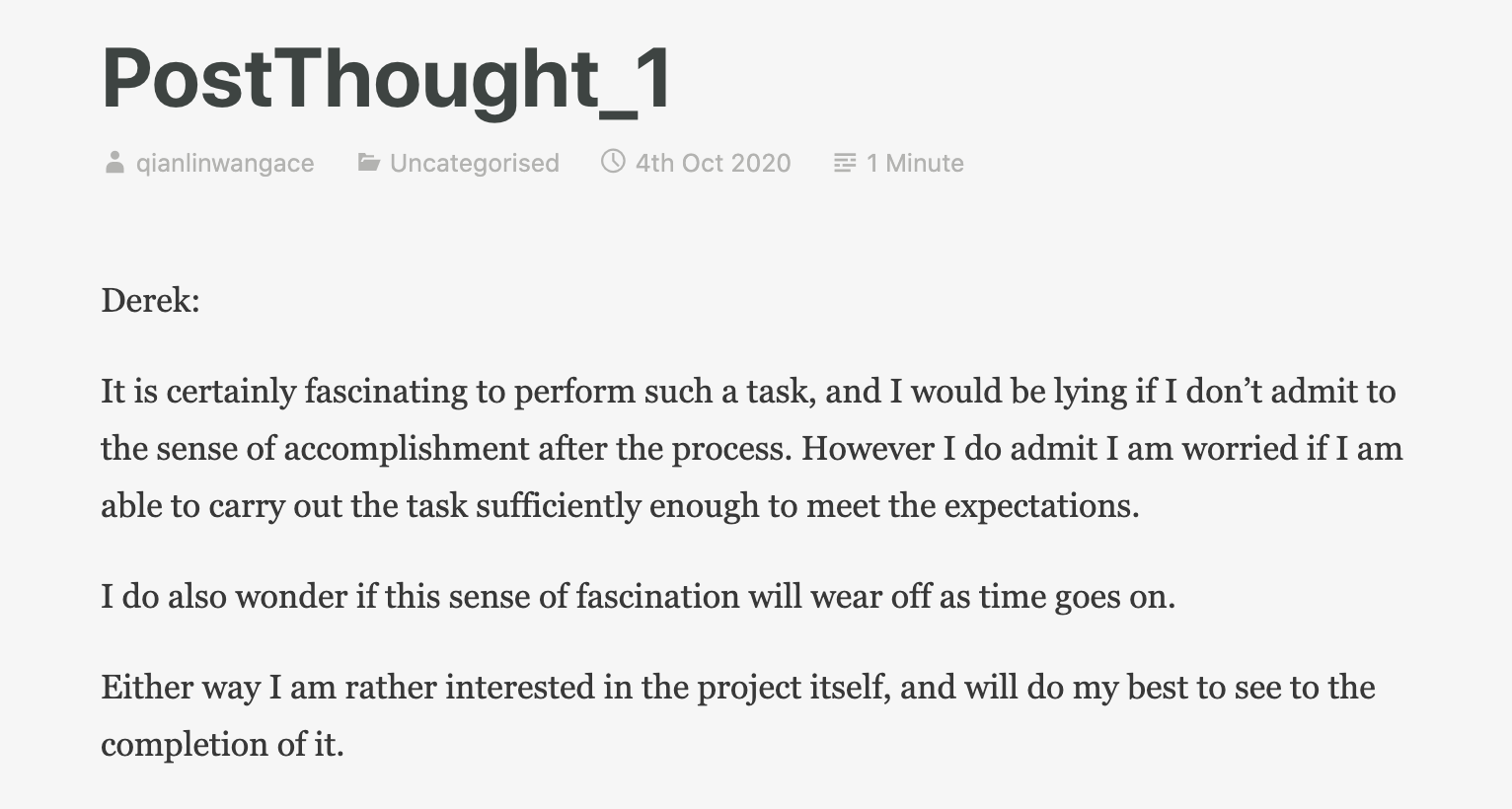


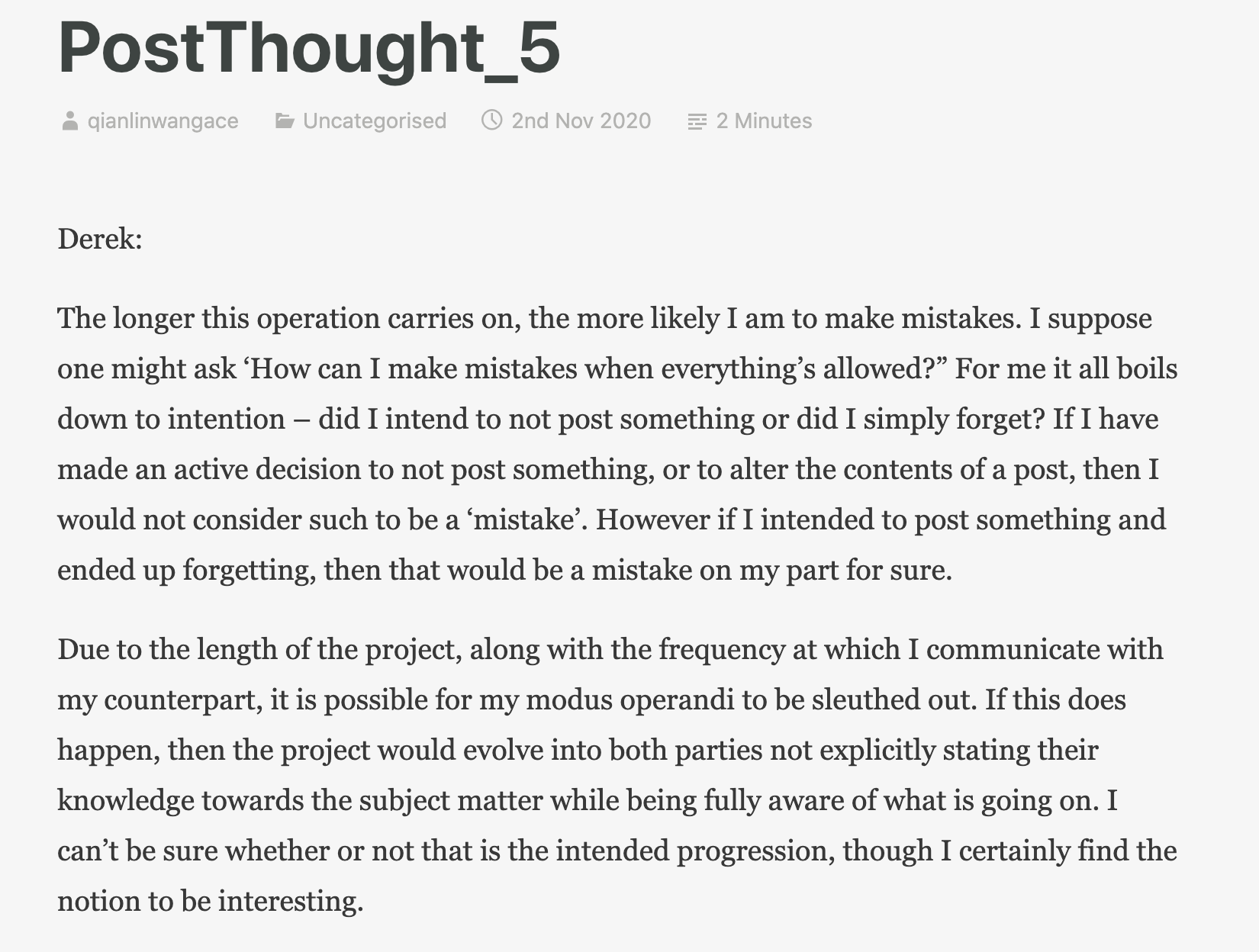

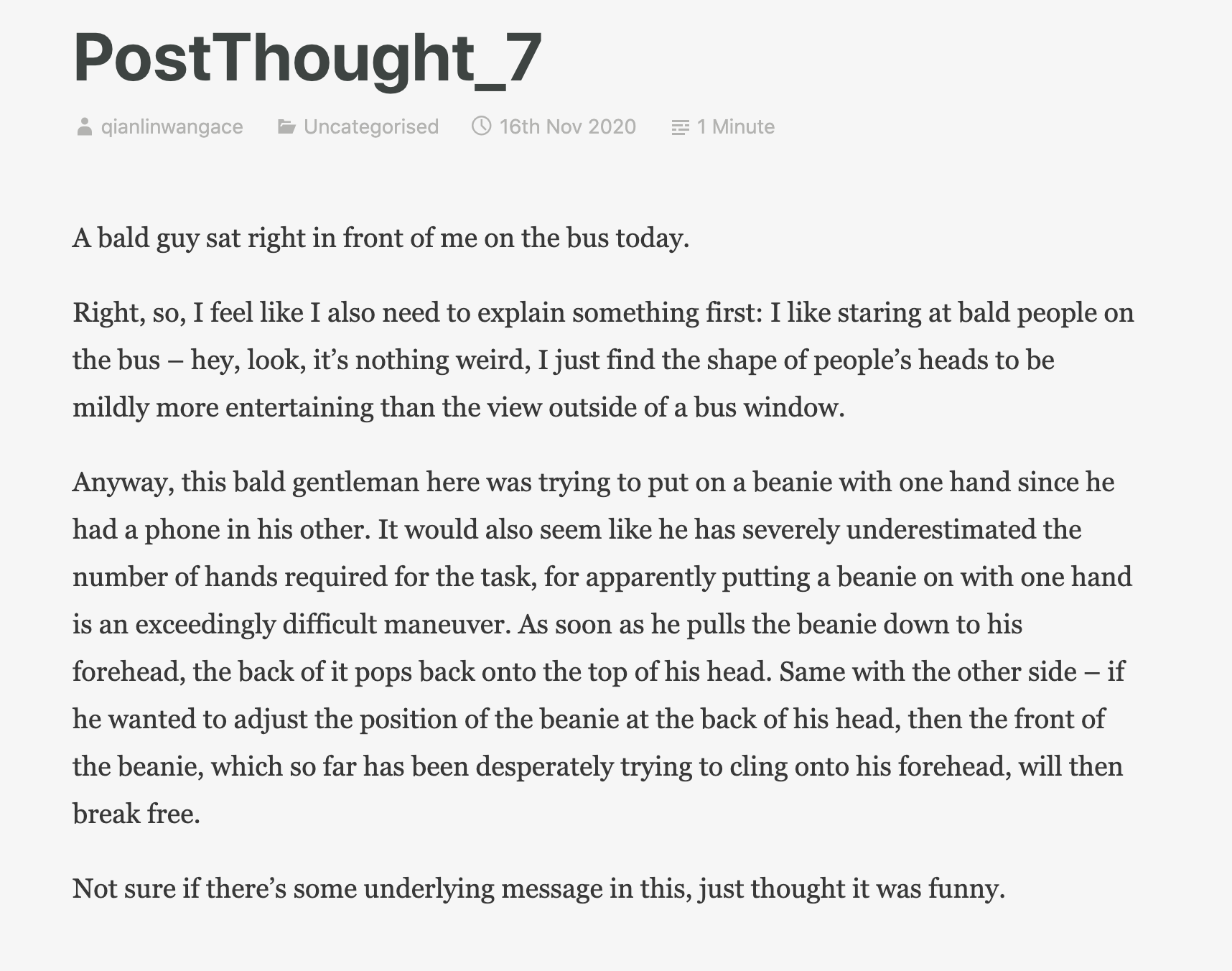
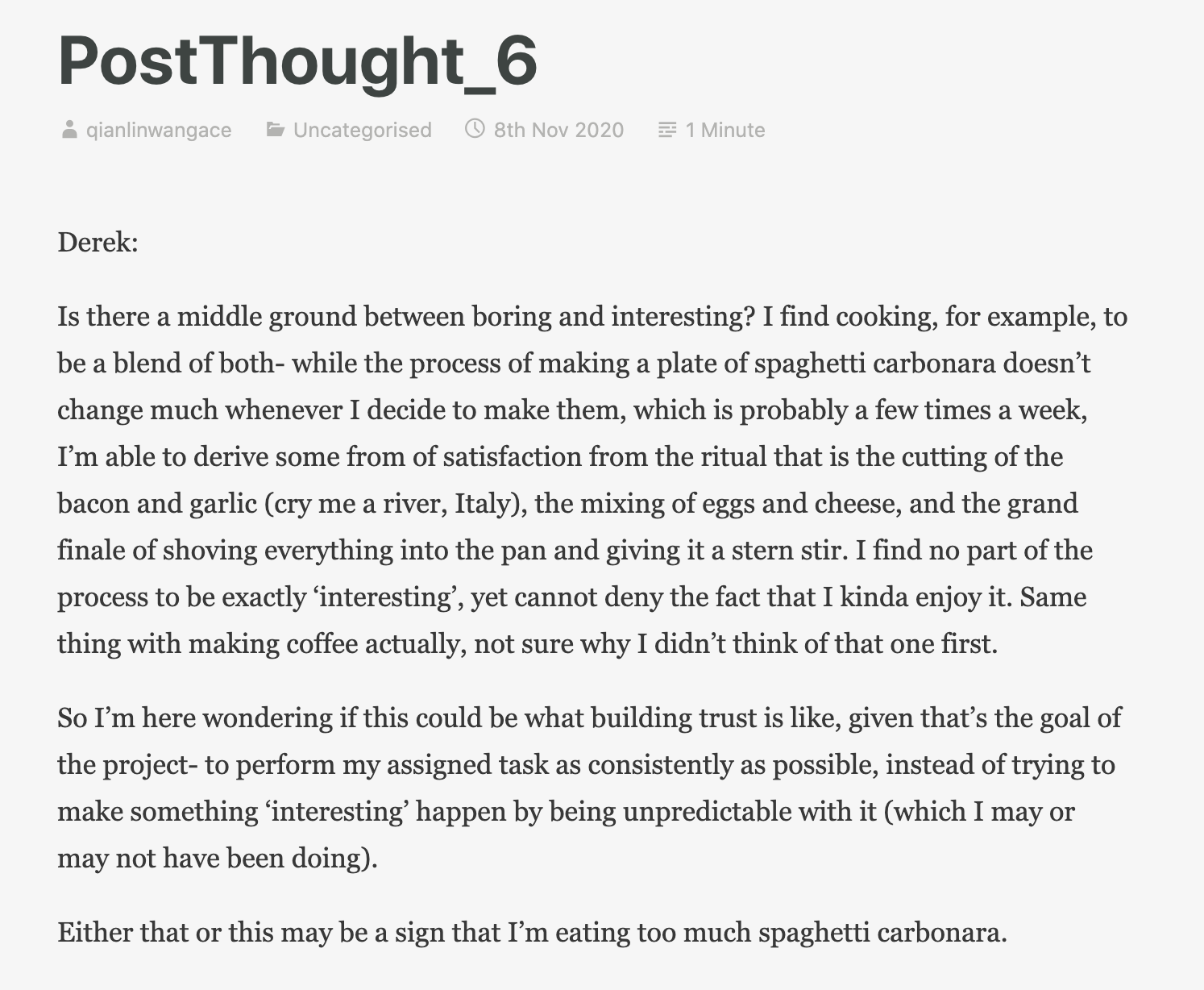
Final post by me:![]()

Do you understand me? I
Can someone really be authentic on social media? In the history, photography is often related to “truth”, while people often forget how limited information an image can convey and how easily the messages can be manipulated by the texts. The reality is replaced by the simulated reality created by social media, and we constantly live in the fear of missing out, and receiving negative judgements on our posts. We feel compelled to perform as long as we are watched, because we are so bounded with this self-generated identity.
This project tries to explore if one can abandon their identity or performativity through bestowing the access and ownership of their social media accounts to someone else. Meanwhile, they still can post through this third party without knowing what is happening with the accounts. Do you understand me? I therefore also discusses trust, and how intimacy is formed through different media, eg: offline and online.
The title is a question for my partner, who needs to guess my preference on the direction of this project; a question for my friends, who know me in person but can’t see my posts; a question for strangers, who don’t know me but have access to those accounts.
Can someone really be authentic on social media? In the history, photography is often related to “truth”, while people often forget how limited information an image can convey and how easily the messages can be manipulated by the texts. The reality is replaced by the simulated reality created by social media, and we constantly live in the fear of missing out, and receiving negative judgements on our posts. We feel compelled to perform as long as we are watched, because we are so bounded with this self-generated identity.
This project tries to explore if one can abandon their identity or performativity through bestowing the access and ownership of their social media accounts to someone else. Meanwhile, they still can post through this third party without knowing what is happening with the accounts. Do you understand me? I therefore also discusses trust, and how intimacy is formed through different media, eg: offline and online.
The title is a question for my partner, who needs to guess my preference on the direction of this project; a question for my friends, who know me in person but can’t see my posts; a question for strangers, who don’t know me but have access to those accounts.
Do
Do you understand me? II
This is a performance between my partner Derek and me as another experiment on intimacy and if we truly can understand another human being. Dreams reveal our deepest secrets and desires where some of them are even unknown to ourselves. In this performance, Derek and I need to come up with our own methods to predict each other’s dreams. Derek proposed to use manipulative tricks on me during the daytime to trigger my nightmares, while I attempted to imitate everything he does for a day to access the unconsciousness. Both of the methods are proven to be futile. Derek dropped the idea for ethical reasons; I found imitating another even for a short period of time to be extremely challenging and gave up in the end. The audio documented our thoughts, process and results about this performance.
Nonetheless, I realised that to be intimate and connect with someone, you don’t need to understand everything about the person, but simply accept them. We believe we need to understand someone to accept them is based on the belief that we will only accept someone if they are similar to us. Following this mindset, conflicts start because ‘they’ are not ‘me’. From this experiment, I found that acceptance doesn’t come after understanding, but before. We want to accept someone, therefore we try our best to understand them.
In 2021, as a part of the group project Being An / No Island, which is exhibited in the international art festival "Heterotopia" at Chelsea College of Arts, artists Elisabeth Wedenig and Zoe Guglielmi recreated this performance in Austria. Unlike the original performance, Elisabeth's approach is more visual and conversational, possibly due to her background as a painter. They exchanged snapshots of their daily lives to each other, meditated on each other's paintings, and did some rituals to help predict each other's dreams.
This is a performance between my partner Derek and me as another experiment on intimacy and if we truly can understand another human being. Dreams reveal our deepest secrets and desires where some of them are even unknown to ourselves. In this performance, Derek and I need to come up with our own methods to predict each other’s dreams. Derek proposed to use manipulative tricks on me during the daytime to trigger my nightmares, while I attempted to imitate everything he does for a day to access the unconsciousness. Both of the methods are proven to be futile. Derek dropped the idea for ethical reasons; I found imitating another even for a short period of time to be extremely challenging and gave up in the end. The audio documented our thoughts, process and results about this performance.
Nonetheless, I realised that to be intimate and connect with someone, you don’t need to understand everything about the person, but simply accept them. We believe we need to understand someone to accept them is based on the belief that we will only accept someone if they are similar to us. Following this mindset, conflicts start because ‘they’ are not ‘me’. From this experiment, I found that acceptance doesn’t come after understanding, but before. We want to accept someone, therefore we try our best to understand them.
In 2021, as a part of the group project Being An / No Island, which is exhibited in the international art festival "Heterotopia" at Chelsea College of Arts, artists Elisabeth Wedenig and Zoe Guglielmi recreated this performance in Austria. Unlike the original performance, Elisabeth's approach is more visual and conversational, possibly due to her background as a painter. They exchanged snapshots of their daily lives to each other, meditated on each other's paintings, and did some rituals to help predict each other's dreams.




